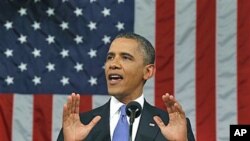As President Barack Obama prepares to announce a plan to slash U.S. government deficits by trillions of dollars, a powerful Republican lawmaker is already criticizing key components reportedly contained in the proposal. Efforts to get more federal revenue from the wealthy and large corporations is likely to be a focus of partisan debate between now and next year’s general election.
The president’s deficit reduction plan will be released Monday. News reports quote White House officials as saying Obama will propose spending restraints and revenue enhancements to slow the growth of the national debt in coming years.
The president has already stated his willingness to trim domestic spending and contain rising costs for programs that provide health care for retirees and the poor. He has also advocated ending tax breaks for favored corporate sectors, and raising taxes paid by America’s wealthiest citizens.
Speaking in North Carolina last week, Obama said the nation has decisions to make.
“Do you want to keep tax loopholes for oil companies, or do you want to renovate more schools and rebuild more roads and bridges so [that] construction workers have jobs again? Do you want to keep tax breaks for multi-millionaires and billionaires, or do you want to cut taxes for small business owners and middle class families?”
The president’s plan reportedly contains a so-called “millionaires tax.” Many of America’s richest earn investment income that is taxed at a lower rate than most wages and salaries. Legendary investor Warren Buffet, one of the world’s richest men, has pointed out that he pays a lower tax rate on billions of dollars of investment income each year than his salaried personal secretary.
Obama has repeatedly stated that everyone must “pay their fair share” of taxes to improve America’s finances and fund badly-needed infrastructure projects and other programs.
But Republicans oppose any tax hikes, particularly during a time of economic weakness. Paul Ryan, chairman of the Budget Committee in the Republican-controlled House of Representatives, said “If you tax something more, you get less of it. If you tax job-creators more, you get less job creation. If you tax investment more, you get less investment.”
Ryan spoke on the Fox News Sunday television program. He said the president’s debt reduction plan, as it is currently being reported, will pit groups of Americans against each other and harm an already-fragile U.S. economy.
“It looks like the president wants to move down the class warfare path. Class warfare will simply divide this country more. It will attack job creators.”
The congressman did give Obama credit for a willingness to extract savings from Medicare and other so-called “entitlement programs.” But he said, so far, the president’s ideas do not go far enough to cut costs and put those programs on a sustainable budgetary path.
A fellow Republican, House Majority Leader Eric Cantor, recently suggested that areas where Democrats and Republicans cannot agree will likely be set aside until after next year’s election. President Obama says, at a time of economic weakness and stubbornly-high U.S. unemployment, there is no excuse for delay.
“A faction in Washington may be content to wait until the next election to do anything. But I have news for them: the next election is 14 months away. And the American people do not have the luxury to wait that long.”
Earlier this month, the president unveiled a new jobs plan that would cut taxes paid by wage earners and employers that hire new workers, and boost domestic infrastructure spending. If no new sources of federal revenue are agreed to, Obama has suggested adding the $447 billion dollars needed to fund his proposal to the work of a bipartisan congressional deficit committee already charged with trimming the deficit by $1.2 trillion dollars over the next 10 years.




